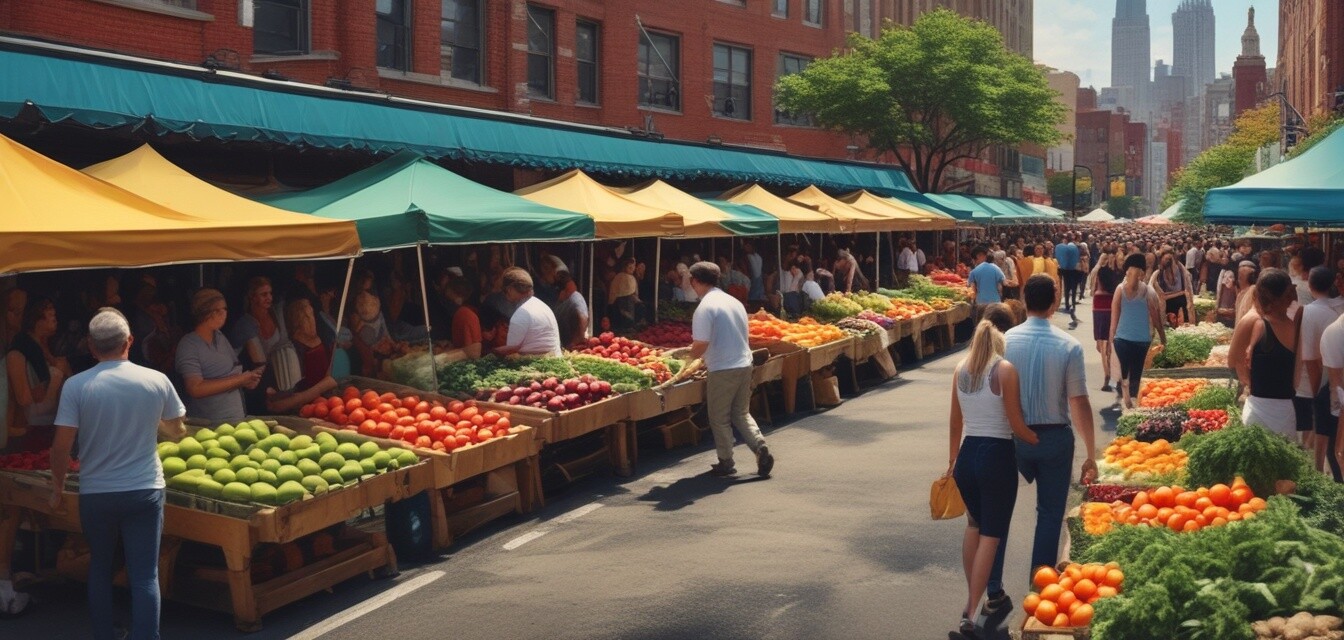
The evolution of farmers' markets in NYC
Key Takeaways
- Farmers' markets in NYC have evolved to incorporate local and sustainable practices.
- Food culture has shifted towards supporting local farmers and seasonal eating.
- Social media plays a significant role in the promotion and popularity of these markets.
- Farmers' markets contribute to community building and access to fresh, healthy food.
- The COVID-19 pandemic has accelerated the innovation in farmers' market layouts and operations.
The landscape of farmers' markets in New York City has transformed dramatically over the years. From mere local gathering spots to vibrant hubs of culinary innovation and community interaction, these markets showcase the dynamism of the city’s food culture. In this article, we will explore how farmers' markets have evolved, their impact on local food culture, and what trends are currently shaping their future. For readers interested in enhancing their culinary experience, don't miss our cooking tips & techniques.
The origins of farmers' markets in NYC
Farmers' markets in NYC date back several decades, primarily revolving around the concept of connecting local farmers with urban residents.
Early days and growth
In the earlier days, markets often reflected a more traditional barter system, allowing small-scale farmers to sell surplus produce. But as demand for organic and local foods grew, so did the markets themselves. Here are some key points outlining their evolution:
- 1976: The first certified farmers' market opens in New York City, paving the way for others.
- 1990s: Growing health consciousness leads to increased public interest in food sourcing.
- 2000s: Emergence of technology allows markets to better promote themselves.
- 2010s: Emphasis on sustainability and education becomes prominent.
Impact on local food culture
As these markets gain popularity, they play a significant role in shaping the broader food culture in New York City.
Support for local farmers
Choosing to shop at farmers' markets helps support local agriculture. This support fosters a robust community of small-scale farmers who focus on sustainable practices.
Encouraging seasonal eating
By shopping at farmers' markets, New Yorkers experience seasonal produce at its peak freshness. This approach has led to:
- Increased awareness of seasonal ingredients.
- Thriving local food collaborations.
- Seasonal festivals celebrating local produce.
Community Engagement
Farmers' markets also serve as social spaces where community members gather. They often host events, cooking demonstrations, and workshops, promoting culinary skills and knowledge.
Current trends in NYC farmers' markets
Today, several trends are evolving within the realm of farmers' markets in NYC.
Social media influence
Social media platforms have significantly contributed to the visibility of farmers' markets. Here’s how:
- Promotion of special events and seasonal produce.
- Community building through online interactions.
- Educational content being shared widely.
COVID-19 impact and adaptations
The COVID-19 pandemic challenged farmers' markets to adapt quickly. Innovations included:
| Adaptation | Description |
|---|---|
| Online ordering | Many markets started offering online pre-orders for easier pickup. |
| Modified layouts | Markets adjusted their setups to promote social distancing. |
| Safety protocols | Increased sanitation and safety measures were implemented for vendor stalls. |
The future of farmers' markets
As we look ahead, the future of farmers' markets in NYC seems bright. They are likely to evolve further by:
- Integrating more technology, like mobile apps for shopping.
- Offering more prepared food options to cater to busy families.
- Creating partnerships with local restaurants and chefs to promote market products.
Overall, farmers' markets not only play a vital role in providing fresh produce but also serve as a platform for community connection and culinary creativity. For those keen on enhancing their kitchen experience, check out our guide on kitchen appliances. These devices can elevate your cooking game as you explore new recipes with fresh ingredients from your local farmers' market.
Pros
- Local support for farmers.
- Access to fresh, seasonal produce.
- Opportunities for community engagement.
- Encouragement of sustainable practices.
Cons
- May not have all products year-round.
- Higher prices compared to supermarkets.
- Weather dependency can affect market attendance.
In conclusion, farmers' markets in NYC are not just places to purchase food but dynamic settings where the community connects, learns, and supports sustainable practices. Stay updated with more trends by visiting our Culinary News & Trends section.